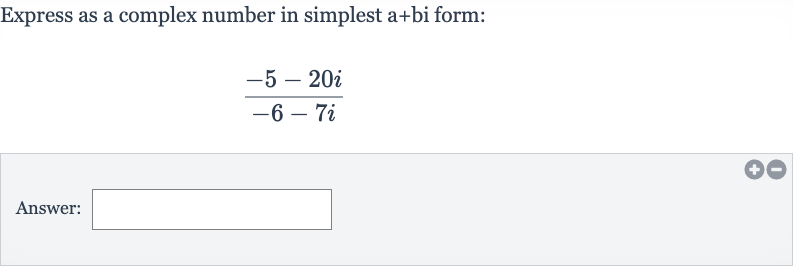Full solution
Q. Express as a complex number in simplest a+bi form:Answer:
- Multiply by Conjugate: To divide complex numbers, we multiply the numerator and denominator by the conjugate of the denominator. The conjugate of a complex number is . So, the conjugate of is .
- Numerator Multiplication: Now, we multiply both the numerator and the denominator by the conjugate of the denominator: .
- Combine Like Terms (Numerator): First, we'll multiply out the numerator:.This simplifies to:.
- Denominator Multiplication: Now, we'll combine like terms in the numerator: simplifies to:.
- Combine Like Terms (Denominator): Next, we'll multiply out the denominator:.This simplifies to:.
- Final Complex Number: Now, we'll combine like terms in the denominator: simplifies to:, since the imaginary parts cancel each other out.
- Simplify Real and Imaginary Parts: We now have the complex number in the form of . To simplify, we divide both the real part and the imaginary part by : .
- Round or Express as Fraction: Simplifying both parts gives us: . However, we should round to a reasonable number of decimal places or write as a fraction if possible.
- Round or Express as Fraction: Simplifying both parts gives us: . However, we should round to a reasonable number of decimal places or write as a fraction if possible.Rounding to two decimal places, we get: . Alternatively, we can express the fractions in their simplest form: .
More problems from Write a quadratic function from its x-intercepts and another point
QuestionGet tutor help
QuestionGet tutor help
QuestionGet tutor help
QuestionGet tutor help
QuestionGet tutor help
QuestionGet tutor help
QuestionGet tutor help
QuestionGet tutor help

